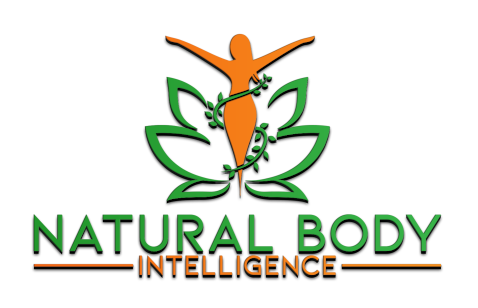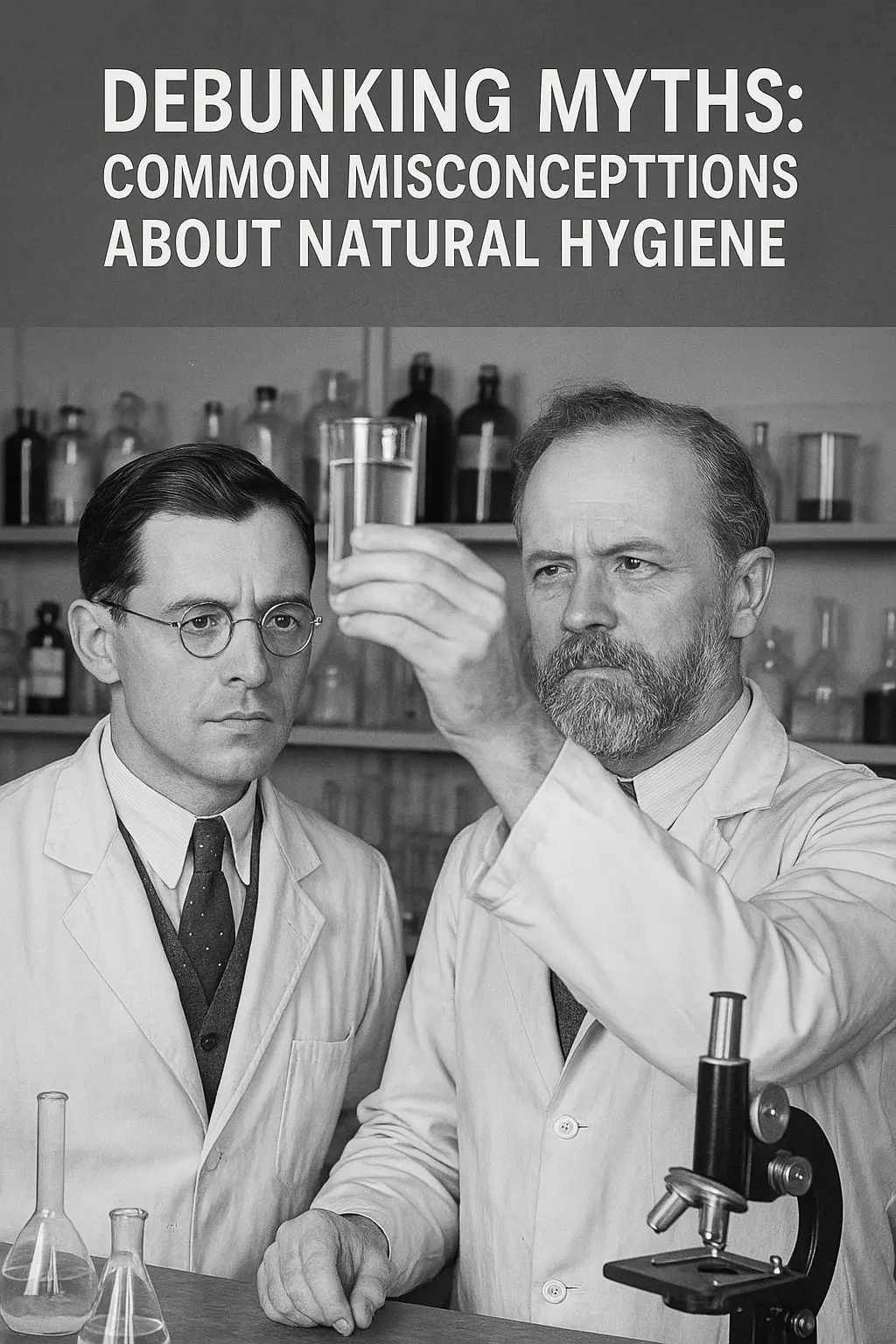Natural Hygiene is one of the most powerful yet misunderstood approaches to health and healing. Rooted in a deep trust in the body’s innate intelligence, it offers a radically different perspective from mainstream medicine and even many “alternative” health systems. Yet, because it challenges widely accepted beliefs, it often attracts misconceptions.
Let’s clear up some of the most common myths — and reveal what Natural Hygiene is truly about.
Myth #1: Natural Hygiene Is Just a Raw Food Diet
Truth: While many Natural Hygienists choose raw, whole, plant-based foods, Natural Hygiene is not a diet — it’s a complete system of health based on the laws of nature. Food is just one part. Equally important are clean air, pure water, sunshine, rest, emotional balance, and freedom from toxins. A person could eat a raw diet and still not be practising Natural Hygiene if they rely on herbs, supplements, or stimulants, or ignore the body’s need for true rest.
Myth #2: It’s Too Extreme or Restrictive
Truth: Natural Hygiene is actually incredibly liberating. Rather than relying on complex protocols, pills, or therapies, it helps you simplify and return to what is natural. You don’t need to become perfect overnight — in fact, small steps in the right direction often bring profound change. And rather than being a list of restrictions, it’s an invitation to let go of what’s harming you and rediscover your body’s original vitality.
Myth #3: It’s Anti-Science
Truth: Natural Hygiene is not anti-science — it simply recognises that the body heals itself, and that interfering with symptoms often causes more harm than good. It’s based on physiology, biology, and nature’s laws. Unlike the disease-suppressing approach of conventional medicine, NH focuses on causes rather than symptoms. This is a scientific principle: remove the cause, and the effect disappears.
Myth #4: It Doesn’t Work for Serious Illness
Truth: Thousands of people have reversed serious conditions — from autoimmune disease to heart problems — by applying Natural Hygiene principles. The body’s capacity to heal is not selective; it operates on the same principles no matter the label given to a disease. What’s required is deep rest, removal of toxins, and giving the body space and energy to repair itself. Healing takes time, but it is possible — and it’s often faster than you’d think once the right conditions are in place.
Myth #5: Fasting Is Dangerous
Truth: When done properly, under the right conditions, fasting is one of the most effective tools for detox and healing. Natural Hygiene sees fasting not as starvation, but as a biological rest — a time when the body can finally direct all its energy towards repair. That said, fasting isn’t about willpower or deprivation. It’s about listening to the body and knowing when nourishment is needed and when rest is more important. Many conditions that baffle modern medicine respond beautifully to supervised fasting.
Myth #6: Natural Hygiene Doesn’t Believe in Germs
Truth: NH doesn’t deny the existence of microbes — it simply recognises that terrain is everything. Germs don’t cause disease; they thrive in conditions where health has already been compromised. A healthy body with clean fluids, proper elimination, and emotional balance does not provide the internal environment in which disease-causing microbes can flourish. As Pasteur himself admitted at the end of his life: “The microbe is nothing. The terrain is everything.”
Natural Hygiene invites us to return to simplicity, to align with nature, and to stop fighting the body’s healing processes. It doesn’t require complex protocols or expensive supplements — just courage, commitment, and a willingness to trust the intelligence of life itself.
By letting go of outdated myths, we open the door to a more vibrant, clear, and honest relationship with our health.
Foundational Observations from Early Hygienists
1. Dr. Isaac Jennings (late 1700s – 1800s)
- Observation: Jennings began treating patients by withdrawing all medicines and advising rest, fresh air, and simple food.
- Result: His patients improved dramatically — more so than when he used drugs.
- Conclusion: He theorised that the body heals through its own “vital force” and that symptoms are part of that healing, not something to suppress.
“All cures are effected by the powers of nature alone.” — Isaac Jennings
2. Dr. Sylvester Graham (1794–1851)
- Observation: Graham noticed that those eating diets rich in fresh fruit, vegetables, and whole grains — and avoiding meat, spices, alcohol, and stimulants — had fewer illnesses.
- Result: He advocated lifestyle changes including clean living, sunlight, and rest — and his followers experienced long-lasting improvements in health.
- Legacy: The Graham cracker was originally designed as a health food based on these ideas!
3. Dr. Herbert M. Shelton (1895–1985)
- Observed thousands of fasts, including long water fasts in supervised settings.
- Case studies include:
- Reversal of arthritis, asthma, obesity, and skin conditions
- Restoration of vitality in “incurable” cases
- Wrote over 40 books on Natural Hygiene, including Fasting Can Save Your Life and The Hygienic System.
- Key contribution: Long-term documentation of healing without medicine, based on fasting, rest, and a return to natural living.
Scientific Studies That Support NH Principles (Indirectly)
1. Fasting and Autophagy (Yoshinori Ohsumi, Nobel Prize 2016)
- Discovery: Autophagy — the process by which the body clears out damaged cells and regenerates new ones — is activated during fasting.
- Supports NH idea that fasting gives the body time to cleanse and repair.
2. The Blue Zones Research (Dan Buettner)
- Observation: People in the longest-living populations worldwide:
- Eat predominantly plant-based diets
- Get regular sunlight and movement
- Live in clean environments with low stress
- Have close social ties and purpose
- Supports NH’s focus on holistic natural living over isolated “cures.”
3. Medical Studies on Fever Suppression
- Many studies (e.g., Plaisance et al., Critical Care, 2000) show that lowering a fever with medication can prolong illness, as fever is part of the immune response.
- NH says: Let the fever run its course unless dangerously high — it’s the body’s healing tool.
Contemporary Observations from NH Practitioners
- Loren Lockman (Tanglewood Wellness Center): Thousands of supervised fasts, documented reversal of chronic fatigue, diabetes, IBS, and more through water-only fasting and lifestyle correction.
- Dr. Keki Sidhwa: Treated cancer and other degenerative conditions with fasting, raw food, emotional healing, and natural hygiene principles in the UK.
- My own experiences: From healing asthma, diabetes, my own health issue, to observing rapid improvements in students and clients through fasting, fruit diets, or lifestyle changes.
Where to Find More Documentation
- Dr. Herbert Shelton’s Hygienic Review archives
- Fasting and Eating for Health by Dr. Joel Fuhrman (originally NH-based)
- Natural Hygiene: Man’s Pristine Way of Life by T.C. Fry
🔗 Historical Reference: Dr. Herbert Shelton’s Natural Hygiene Library
Dr. Herbert Shelton supervised thousands of fasts and documented healing through Natural Hygiene over several decades. His writings are foundational to understanding the principles of self-healing, fasting, and nature-based living.
📚 Access his full library of writings and case studies here:
👉 https://soilandhealth.org/03sov/0302hsted/0302homelibrary.html
🔬 Academic Reference: Fever Suppression and Healing
Conventional medicine often suppresses fever, but scientific research shows this can interfere with natural body responses — supporting the Natural Hygiene approach of allowing symptoms to express and resolve naturally.
🧾 Read the study: The effects of antipyretic therapy on mortality in critically ill patients with sepsis: a meta-analysis (Plaisance et al., Critical Care Medicine, 2000)
👉 https://pubmed.ncbi.nlm.nih.gov/10667619/

